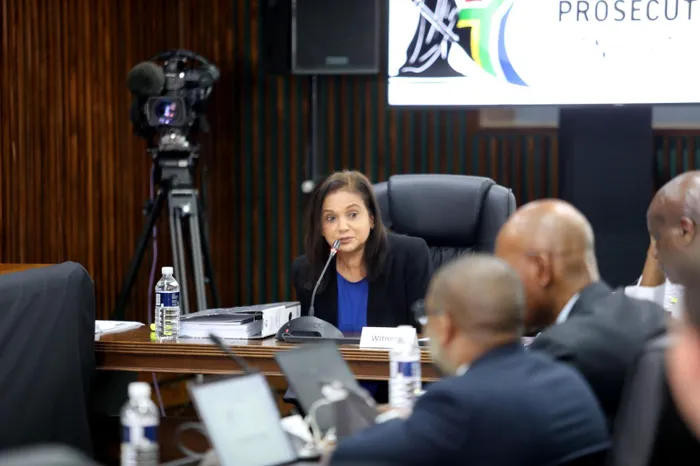WATCH | Batohi continues testimony before Nkabinde Inquiry

The Nkabinde Inquiry hears testimony from Batohi as it scrutinises Chauke’s prosecutorial decisions, highlighting controversies around the Booysen racketeering charges and the Mdluli withdrawal to assess his fitness for office.
Image: Oupa Mokoena/Independent Newspapers
National Prosecuting Authority’s Head, Advocate Shamila Batohi, is back on the witness stand at the Nkabinde Inquiry on Wednesday.
The inquiry is probing suspended South Gauteng Director of Public Prosecutions Advocate Andrew Chauke‘s fitness to hold office.
It follows a complaint by NDPP Batohi and focuses on two particularly controversial cases: the racketeering prosecution of Major-General Johan Booysen and members of the Cato Manor Organised Crime Unit, and the discontinuation of murder charges against former police crime intelligence head Lt-Gen Richard Mdluli.
Batohi is testifying before Advocate Bess Nkabinde, with evidence led by Advocate David Mohlamonyane SC.
On Tuesday, the inquiry confirmed that its Evidence Leading Team has been strengthened to ensure it can manage the demanding workload.
In a statement, Nkabinde Inquiry spokesperson Tiyisela Mpuzana announced the appointment of Advocate David Mtsweni and Advocate Themba Skosana SC to join Mohlamonyane.
Mpuzana said the expansion of the team “has been informed by the volume of documents and evidence to be traversed, the complexity of the issues before the Enquiry, and the Enquiry’s commitment to adhering to its timelines.”
He added that the appointments are meant to “support the orderly and efficient presentation of evidence, while ensuring the continued fairness, transparency, and integrity of the proceedings.”
During her testimony on Tuesday, Batohi highlighted an extensive documentary trail, including affidavits, internal memoranda, and correspondence, that she said demonstrated Chauke’s direct involvement in key prosecutorial decisions.
She stressed that the evidence demonstrated Chauke was "the DPP in charge of the matter," not just a liaison with limited authority.
"Chauke was not merely a coordinator; he was deeply embedded in the prosecution decisions," Batohi said.
The testimony focused particularly on the legal proceedings that followed the racketeering charges against Major-General Johan Booysen and the Cato Manor Organised Crime Unit.
In April 2013, Booysen challenged two racketeering authorisations issued by then-acting NDPP Advocate Nomgcobo Jiba.
Batohi explained that in response to Booysen's challenge, an affidavit was filed by Jiba, which was, in fact, "finalised by Advocate Chauke," as per Jiba’s own testimony.
Further evidence, including consultation notes from Advocate Laurance Hodes SC and an internal NPA memorandum authored by Advocate Anthony Mosing, indicated Chauke’s central role in the prosecution.
The memorandum, dated June 4, 2013, outlined how Chauke had led the prosecution team during meetings with Hodes and other senior counsel, preparing for Booysen’s review. Batohi explained that these documents contradicted earlier suggestions that Advocate Sello Maema, the technical lead, was responsible for the prosecution.
“Advocate Maema led the technical team, while Advocate Chauke was the overall person in charge of the prosecution,” Batohi said.
Batohi also referred to an affidavit filed by Jiba in the General Council of the Bar proceedings, where she confirmed that Chauke had served as the liaison between the prosecution team and Hodes SC.
This included providing counsel with all the necessary facts and evidence from the investigation dockets. Batohi stressed that Chauke's involvement went beyond logistical coordination and extended to substantive decisions on the case, including strategies for the appeal.
In an effort to clarify her position, Batohi addressed earlier questions from the chairperson, Advocate Bess Nkabinde, who had raised concerns about inconsistencies in her testimony regarding Chauke’s knowledge of the case.
Batohi firmly maintained that her evidence showed Chauke’s direct participation in prosecutorial decisions, especially in relation to the appeal process. She highlighted that the documentation, including Jiba’s affidavit and Chauke’s own confirmatory affidavit, confirmed his substantial role in the case.
“Taking a matter on appeal is a prosecutorial decision,” Batohi said. “His involvement in the appeal process goes directly to the question of his role. He was not simply coordinating logistics; he was participating in strategic decisions.”
She said that the evidence unequivocally demonstrated that Chauke was acting as the DPP in charge, deeply involved in the prosecution strategy, and making critical decisions throughout.
hope.ntanzi@iol.co.za
IOL Politics
Related Topics: